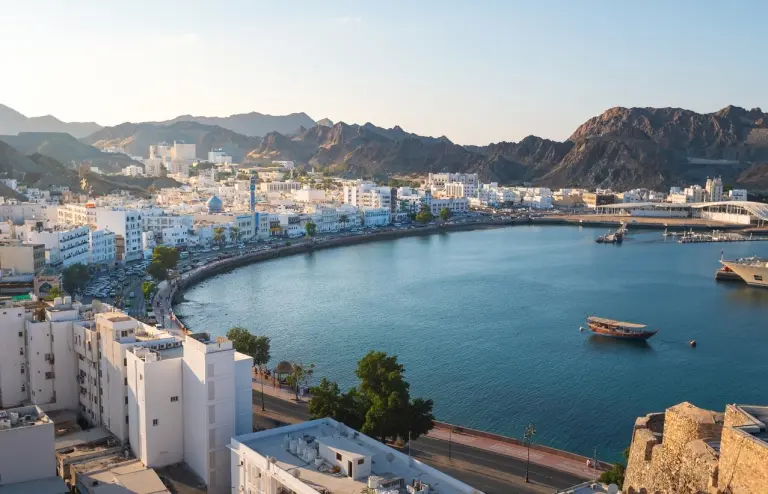Build a global team in minutes
Get expert helpFor many, Ireland has it all. Rolling green hills, picturesque sea cliffs, vibrant cities, yes, but also, global giants. Facebook, Intel, JP Morgan. They're all there. And it's not just the Guinness that's drawing them in.
On top of its natural beauty and rich cultural heritage, Ireland has a corporate tax rate that, simply put, is very attractive to international businesses. Plus, it's right there, just a stone's throw from the rest of Europe. And that's why Ireland has become a kind of magnet for companies looking to expand and for skilled workers trying to find their next opportunity.
As always, there's a bit of a catch; you'll need to understand Irish visa procedures and immigration laws, and we're talking in a my-legal-team-can-sleep-at-night sort of way. So if you're a company trying to bring someone in from abroad. Or if you're that someone hoping to work in Ireland legally. You've got to understand how the whole system works.
We're going to walk through all that, laying out what you need to know about work visas in Ireland. Who needs what, how to apply, and the main things to consider when hiring or relocating talent. It's not always simple-but it can be made a lot easier if you know what you're doing.
Who requires an Ireland work visa?
Citizens of countries in the European Economic Area (EEA) and Switzerland don't need a work visa to reside and work in Ireland. However, individuals from all other non-EEA countries do.
The EEA includes all 27 EU member states, plus Norway, Iceland, and Lichtenstein. Due to Brexit in 2020, the U.K. is no longer a member of the EEA, and its citizens must now apply for an Ireland work visa if they wish to live and work in the country.
Common types of work permits and visas in Ireland
Ireland offers non-EEA nationals several types of work permits for living and working in the country. The most common are the Critical Skills Employment Permit and the General Employment Permit.
Critical Skills Employment Permit
The Critical Skills Employment Permit offers highly skilled professionals a simplified procedure for living and working in Ireland. You may also hear people call this permit the Irish skilled worker visa.
This permit is available to individuals from specific occupational backgrounds with a skills shortage in the country, like information and communications technology (ICT), nursing, therapy, and engineering.
Eligibility criteria
To qualify, applicants must have a two-year job offer with a €38,000 annual salary from a locally incorporated company plus a relevant degree.
Individuals in roles that aren't on the list of eligible occupations may still qualify if they earn at least €64,000 annually and have a degree or equivalent experience.
For employers to sponsor a foreign national on this visa, over 50% of their workforce must be EU citizens. This is called the 50:50 rule.
Benefits of the Critical Skills Employment Permit
This visa comes with several unique benefits. For instance, applicants don't need to pass a Labor Market Needs Test, meaning their employer doesn't have to advertise the job locally before hiring a foreign national to fill the role.
Also, after two years of living and working in Ireland on this visa, the visa holder may apply to continue working in Ireland without a work permit.
General Employment Permit
The General Employment Permit in Ireland is a standard Irish work permit that allows non-EEA nationals from a broad range of occupational backgrounds to live and work in the country.
Its main advantage is that it's available to individuals from a much wider range of occupations than most other Irish work permits.
To qualify, applicants must have a 12-month employment contract for an approved occupation from a locally incorporated company. They must also earn a salary of at least €34,000 annually.
Applicants must pass a Labor Market Needs Test, and employers must satisfy the 50:50 rule.
Other work permits and visas in Ireland
Irish authorities offer seven other work permits, besides the two discussed above, that allow individuals from various backgrounds and circumstances to live and work in the country.
- Intra-Company Transfer Permit. This permit allows locally incorporated Irish businesses to transfer senior management, key personnel, and trainees from an overseas branch of their multinational corporation to their Irish branch.
- Sport and Cultural Employment Permit. This permit allows non-EEA nationals with relevant qualifications to relocate to Ireland for employment in the sports and entertainment sectors.
- Exchange Agreement Employment Permit. This permit creates a channel for non-EEA nationals to live and work in Ireland according to international reciprocal agreements between Ireland and the applicant's country of citizenship.
- Reactivation Employment Permit. This permit allows non-EEA nationals who entered Ireland on an employment permit but fell out of the system for reasons out of their control or who were exploited in the workplace to return to legally work in the country.
- Internship Employment Permit. This permit allows non-EEA nationals who are full-time students in fields related to occupations on the Critical Skills Occupations List and enrolled in higher education outside of Ireland to gain work experience in Ireland.
- Contract for Services Employment. This permit allows non-EEA nationals with contract work in Ireland to visit the country to fulfill their obligations and transfer non-EEA employees to work there as needed.
- Dependent/Partner/Spouse Employment Permits. This permit allows the dependents, partners, and spouses of Critical Skills Employment Permit holders and of researchers on hosting agreements to work in Ireland.
Ireland work visa requirements
The exact requirements for Irish work visas vary across each visa category. However, below you can find a general list of documents all candidates must prepare for their application:
- Valid passport. The applicant's passport must have two blank visa pages and be valid for at least 12 months beyond their proposed date of arrival in Ireland.
- Passport photos. The applicant must provide two passport-sized photos that satisfy Ireland's visa photo requirements.
- Work contract copy. This is a copy of the work contract signed by the employee and the employer.
- Proof of residence. This refers to proof of legal residence in the country where the candidate applies for their visa.
- Immigration stamp. If the applicant is an Irish resident when submitting their application, they must provide a copy of their current Irish immigration stamp.
- Employer's contact details. This must include a relevant person's name, their position in the company, phone number, and email address.
- Proof of company incorporation. This refers to a document containing the Employer Registered Number (ERN) and Company Name Registered Number.
- Additional employer information. This refers to important details, such as the company name, registered address, company type, and the nature of its business.
- Employment details. This includes all relevant information from the employment contract, such as the salary, work duties, and employment duration.
- Proof of accommodation. This refers to a lease agreement for accommodation in Ireland or a document from the employer proving that the company will provide housing for the employee upon arrival.
- Proof of qualifications. This refers to relevant degrees, education certificates, or proof of previous work experience.
- Proof of medical insurance. Applicants must have private medical insurance in Ireland covering at least €25,000 for instances of disease, accidents, and hospitalization.
How to get a work visa in Ireland
The process for applying for permission to live and work in Ireland has two primary steps: applying for a work permit and applying for a work visa or pre-clearance.
The work permit gives the applicant permission to work in Ireland, while the work visa permits them to enter the country and apply for a residence permit upon arrival.
Not all applicants have to acquire a work visa before entering Ireland. This requirement depends on the applicant's country of residence.
Below is a detailed outline of the required steps to apply for both documents and move to Ireland for work.
1. Apply for an Irish work permit
The employer must apply for a work permit through the Employment Permits Online System (EPOS) at least 12 weeks before the intended employment start date.
During the application process, the employer must upload scanned copies of the required documents with the necessary signatures and pay the application fee.
The processing time is roughly 13 weeks, and fees range from €500 to €1,000, depending on the permit applied for and its duration.
2. Apply for an Irish work visa
If the applicant is from a country whose citizens need a visa to enter Ireland, they must also apply for a work visa.
Required documents for an Irish work visa application include:
- A work permit
- A valid passport
- Passport-sized photographs
- Health insurance
- A bank statement
- An employment contract
Candidates must submit their application through the AVATS online portal. The processing time is about eight weeks, and the fee is €60 for a single entry visa or €100 for multiple entry.
If the applicant is from a country that doesn't need a visa to enter Ireland, they must still receive pre-clearance through the AVAT portal before entering the country.
3. Travel to Ireland
After receiving their Irish work permit and visa (or pre-clearance), the employee may travel to Ireland.
4. Register for an Irish Residence Permit (IRP) upon arrival
Individuals with visas from most work visa categories must register with the nearest Garda National Immigration Bureau (GNIB) upon arrival.
After registering with the GNIB, the employee receives an Irish Resident Permit (IRP), allowing them to live and work in the country.
Considerations before obtaining an Ireland work visa
It's important to note that all foreign nationals relocating to Ireland for work require sponsorship from a locally incorporated entity. This can be a major obstacle for many global companies hiring or relocating foreign talent to the country.
A simple solution is to partner with an employer of record (EOR) in Ireland. An EOR is a third-party organization that facilitates global mobility for international companies. By serving as the legal employer of your international workforce, an EOR allows you to quickly hire and relocate top talent worldwide without establishing local entities.
An EOR can also handle all hiring, onboarding, immigration, and compliance issues on your behalf so you can test the Irish market and easily hire foreign nationals without the added burden.
Learn more: What Is an Employer of Record (EOR)?
Ireland work visa FAQs
How long does it take to get an Ireland work visa?
Applying for an Irish work permit and visa takes about 21 weeks. This period may be shorter if the candidate is from a country whose residents don't need to apply for a work visa to enter Ireland for work purposes.
How much does an Ireland work visa cost?
The cost of applying for an Ireland work visa ranges from €60 for a single-entry visa to €100 for a multiple-entry visa. However, before applying for a work visa, all candidates must apply for an Irish work permit, which costs between €500 and €1,000.
That means the total cost of acquiring an Irish work permit and visa ranges from €560 to €1,100.
How long does an Ireland work visa last?
Ireland work visas are valid for different periods, depending on the visa category. Generally speaking, work visas are valid for six months to two years and are renewable for two to three years at a time.
Expanding to Ireland the easy way, with Pebl
Expanding to Ireland certainly has its upsides; talent, access to the EU, that low corporate tax rate. But if you're a foreign company trying to actually do it, bringing in your own people or hiring internationally, there's going to be some challenges.
There are compliance issues. Bureaucracy. Delays that can drag on for weeks, or months. And the whole thing? It can slow your momentum to a crawl.
Which is precisely where Pebl steps in. Our Global Immigration capabilities and Employer of Record services in Ireland take all that complexity and make it manageable. We handle the complex tasks: collecting documents, navigating the rules, and keeping everything compliant. That way you're not stuck figuring out Irish immigration law when you should be onboarding your next hire.
How does this look in practice? Glad you asked. ConsenSys, a global blockchain technology company, needed to move top talent from the U.K. to Switzerland, and they needed to do it in three weeks. We stepped in and made it happen, without any legal headaches or delays to their product roadmap. There's more to the story, but that's the bottom line. And it's the bottom line every time when you work with Pebl.
Contact us today to learn how Pebl can simplify your global hiring efforts and help you easily hire top talent in Ireland.
Disclaimer: This information does not, and is not intended to, constitute legal or tax advice and is for general informational purposes only. The intent of this document is solely to provide general and preliminary information for private use. Do not rely on it as an alternative to legal, financial, taxation, or accountancy advice from an appropriately qualified professional. The content in this guide is provided "as is," and no representations are made that the content is error-free.
© 2025 Pebl, LLC. All rights reserved.
Topic:
Immigration + Relocation


